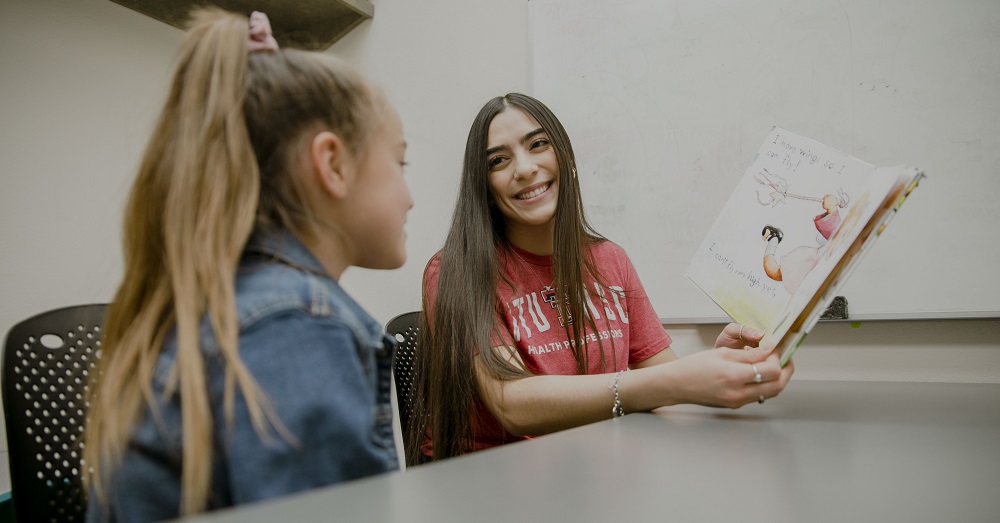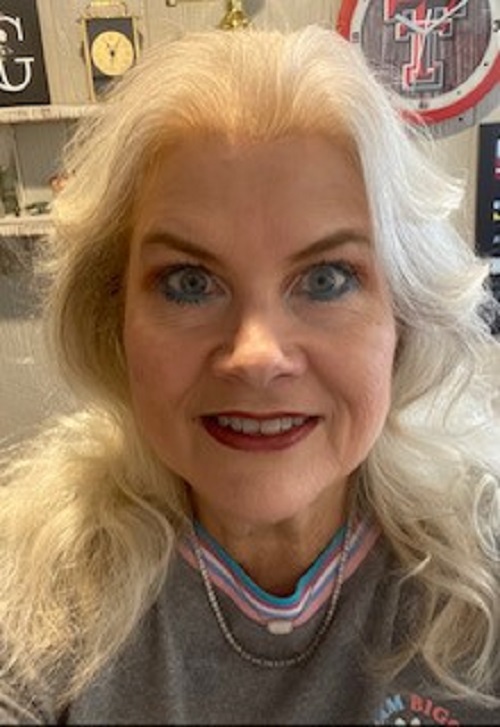Speech-Language Pathology Programs at TTUHSC and How They are Helping Fill an Important Void
TTUHSC developed a unique program to get Speech-Language Pathology Assistants great jobs in education.

TTUHSC's program provides a foundation of knowledge in communication sciences and disorders
The Department of Speech, Language & Hearing Sciences in the TTUHSC School of Health Professions offers a Bachelor of Science in Speech, Language, and Hearing Sciences and a Master of Science in Speech-Language Pathology.
The Bachelor's program provides a foundation of knowledge in communication sciences and disorders, including anatomy and physiology of the speech and hearing mechanisms, language development, and communication disorders. Students also complete clinical observation experiences in a variety of settings. Graduates of the Bachelor's program are prepared to pursue graduate study in Speech-Language Pathology or related fields.
The Master's program includes coursework in areas such as voice disorders, cognitive-communication disorders and swallowing disorders. Students also complete clinical practicum experiences in a variety of settings, including schools, hospitals and private practices. Graduates of the program are eligible to apply for national certification through the American Speech-Language-Hearing Association and for state licensure in Speech-Language Pathology.
Speech-Language Pathologists (SLPs) are an essential part of the education system, working with students who have speech, language, swallowing or communication disorders that may impact their academic and social success.
However, schools across the country are experiencing a shortage of qualified SLPs.
A Shortage of Qualified SLPs
This shortage can be attributed to various factors, including increased demand for services, high turnover rates and limited funding for education. To help fill the void, schools are turning to Speech-Language Pathology Assistants to provide critical support to SLPs and deliver services to students.
We spoke with Lisa Gore, MS, CCC-SLP, about the important role Speech-Language Pathology
Assistants play in providing services to those who need it the most and how TTUHSC
is helping to put more licensed graduates in the field.
Gore serves as an Instructor in the Department of Speech, Language, and Hearing Sciences
in the TTUHSC School of Health Professions.
Explaining the Speech-Language Pathology Shortage
Speech-Language Pathology Assistants are licensed to work only in specific settings. They cannot work in any facility where patients can be covered by Medicare, so this rules out hospitals and skilled nursing facilities. They can, however, serve students in educational settings and through home health services.
“What we’re seeing across the board, specifically in school settings, is that there are just not enough Speech-Language Pathology Assistants being produced at the college level that want to go into school services,” Gore says.
This is leading to more and more children not being adequately served, which results in more deficits as they grow up. Put simply, the demand for service is high, and the supply of providers is low.
“Many more children are coming to us in the home-health setting and school settings with significant deficits,” she says.
The SLP Shortage in Education Services
Gore explains that many SLPs' first career choice is in medical intervention services such as a hospital, rather than working in schools. An understandably large part of this is due to practical economics.
Even taking into consideration the benefits of a teaching schedule and vacation time, many new graduates tend toward a higher paycheck.
“If you're looking at $50 an hour versus a new teacher salary, it's just not as enticing," she says. “And that's where we're seeing Speech-Language Pathology Assistants beginning to really be used to support those services.”
The SLP Shortage in Home Health Services
There are similar factors driving a shortage of SLPs that provide home health services as well. While home health providers tend to pay a competitive hourly rate and can be used to serve pediatric patients, there are scheduling and economic drawbacks for the SLP.
“The situation with home health for SLPs is that if your client’s not home or cancels an appointment, you don’t get paid,” she explains. “So that has been an issue that causes some SLPs to say, ‘I need a more viable income.’”
“So when you're looking at needing providers for SLP therapy services, many of our school districts, many of our home-health agencies are having to say, ‘Okay, we've got to get these kids serviced. How are we going to do it?’”
Turning to the Speech-Language Pathology Assistant

Lisa Gore, MS, CCC-SLP
Speech-Language Pathology Assistants don’t provide therapies for feeding and swallowing disorders and do not work with medically fragile children.
“They are a great support for language and articulation needs,” Gore explains.
In Texas, a SLP is allowed to supervise up to four Speech Language Pathology Assistants. “They shouldn’t, because it’s a lot,” Gore says, “But they can.”
It’s easy to realize how the numbers compound.
A Speech-Language Pathology Assistant may have anywhere between 50 and 80 students. Along with the therapies provided, the Speech-Language Pathology Assistant is performing screenings, preparing documents for the SLP, and documenting progress for each student.
The SLP performs assessments and attends Admissions Review and Dismissal Committee meetings to discuss student progress. If the SLP is supervising four Speech-Language Pathology Assistants, he/she could be responsible for at least 200 students.
Servicing Rural Schools
“Speech-Language Pathology Assistants are the answer for rural schools,” Gore says. “People aren’t looking to work in those areas.”
As a small-town native, Gore noticed the lack of providers in rural West Texas towns. In Texas, a SLP can be hired by a school district or a co-op of several schools. Many were paying for service providers who were unable to provide enough services.
“So, I went to leadership and asked to set up a program,” she says.
Becoming a Speech-Language Pathology Assistant with TTUHSC
To be a licensed Speech-Language Pathology Assistant, one must complete 50 hours split between observation and providing hands-on therapy to prove they can do the job.
“The problem is, how do they get a job to get those 25 hours?” Gore says. “Because employers don’t want to hire someone who isn’t licensed.”
Gore set out to find a way for students to receive those 25 hours so they would graduate with their license. This led to a one-of-a-kind summer program for TTUHSC students graduating with their Bachelors degree in Speech-Language Pathology.
The summer after the students graduate with their Bachelors degree, they have the opportunity to apply for a summer program of clinicals and camps, where they can achieve their 25 hours of hands-on therapy.
“The hope is that they get their 25 hours through the summer and are available to take a job before school begins in the fall,” Gore explains. “It allows those Bachelors degree students to tell potential employers that they’re anticipating being license ready.”
The Rewards of a Career as a Speech-Language Pathology Assistant
A career as a Speech-Language Pathology Assistant can be immensely rewarding. Not only does it provide an opportunity to work in a field that helps children with communication disorders, but it also offers the chance to work closely with Speech-Language Pathologists and other healthcare professionals. And the demand for these professionals is expected to grow in the coming years, providing job security and stability.
“We’ve had a 100 percent employment rate,” Gore says. “My favorite part is that many of those students have gone on to become SLPs.”
For those interested in pursuing a career in healthcare and helping others, becoming a Speech-Language Pathology Assistant is a promising option and is helping to fill a vital need in our society today.
Related Stories
TTUHSC Receives $1 Million Gift from Amarillo National Bank to Expand and Enhance Pediatric Care in the Panhandle
TTUHSC School of Medicine leaders accepted a $1 million philanthropic gift from Amarillo National Bank on Tuesday (Feb. 10), marking a transformational investment in pediatric care for the Texas Panhandle.
Texas Tech University Health Sciences Center Permian Basin Announces Pediatric Residency Program Gift
TTUHSC Permian Basin, along with the Permian Strategic Partnership and the Scharbauer Foundation, Feb. 5 announced a gift that will fund a new pediatric residency.
The Ph.D. Programs that Shape Health Care
The Graduate School of Biomedical Sciences Ph.D. programs at TTUHSC provide the foundation, mentorship and research opportunities you need to pursue groundbreaking work.
Recent Stories
The John Wayne Cancer Foundation Surgical Oncology Fellowship Program at Texas Tech University Health Sciences Center Announced
TTUHSC is collaborating with the John Wayne Cancer Foundation and has established the Big Cure Endowment, which supports the university’s efforts to reduce cancer incidence and increase survivability of people in rural and underserved areas.
TTUHSC Receives $1 Million Gift from Amarillo National Bank to Expand and Enhance Pediatric Care in the Panhandle
TTUHSC School of Medicine leaders accepted a $1 million philanthropic gift from Amarillo National Bank on Tuesday (Feb. 10), marking a transformational investment in pediatric care for the Texas Panhandle.
Texas Tech University Health Sciences Center Permian Basin Announces Pediatric Residency Program Gift
TTUHSC Permian Basin, along with the Permian Strategic Partnership and the Scharbauer Foundation, Feb. 5 announced a gift that will fund a new pediatric residency.
